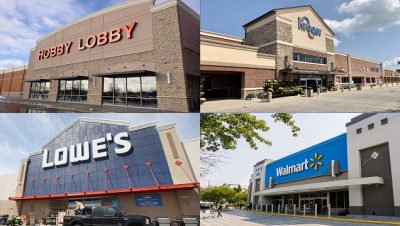
Retail, Industrial Single Tenant Net Lease Cap Rates Reach New Lows

Cap rates for net lease retail and industrial assets reached record lows during the first quarter as investor demand for these properties reached “historic” levels, reported Boulder Group, Wilmette, Ill.
The firm’s first-quarter Net Lease Research Report said single tenant retail cap rates compressed by 9 basis points to 5.91 percent and industrial sector cap rates compressed by 4 basis points to 6.71 percent.
The only exception to this trend was the office sector, where cap rates increased slightly during the quarter, rising 5 basis points to 6.95 percent, said Boulder Group President Randy Blankstein.
“Cap rate compression for retail and industrial assets can be best attributed to investor demand for secure cash flow streams” Blankstein said. “Office cap rates increased due to general concerns regarding office utilization following the pandemic.”
Despite a 9 percent increase in property supply during the quarter, there is still a shortage of high-quality assets with long-term leases in the net lease market. Accordingly, owners of lower-quality assets brought properties to the market to try to take advantage of the compressed cap rate environment, the report said.
“The limited supply of high-quality assets created increased competition among investors,” Boulder Group Partner Jimmy Goodman said. “This competition has created significant pressure on cap rates despite the recent uptick in the 10-year treasury yield.”
Boulder Group Senior Vice President John Feeney noted many passive real estate investors shifted their focus to “essential” business-related tenants as COVID-19 affected the net lease landscape.
“Some of the essential business tenants commanded the most attention from investors and warranted the lowest cap rates in the sector,” Feeney said. He said 7-Eleven, CVS and McDonald’s cap rates equaled 4.90 percent, 5.00 percent and 4.00 percent respectively in the first quarter for recently constructed assets.
The report said net lease sector transaction volume should remain active as optimism increases following the economy’s recovery from COVID-19. Section 1031 like-kind exchange and private capital investors will continue to seek assets with long-term leases, strong tenants and top metro locations, causing cap rates for these assets to remain low, it said.
“Certain segments including fitness and second-tier casual dining should become more investable at pre-pandemic pricing again,” Blankstein said. “Investors will be carefully monitoring the economy as it looks to recover from the pandemic combined with the impact of multiple rounds of stimulus.”
